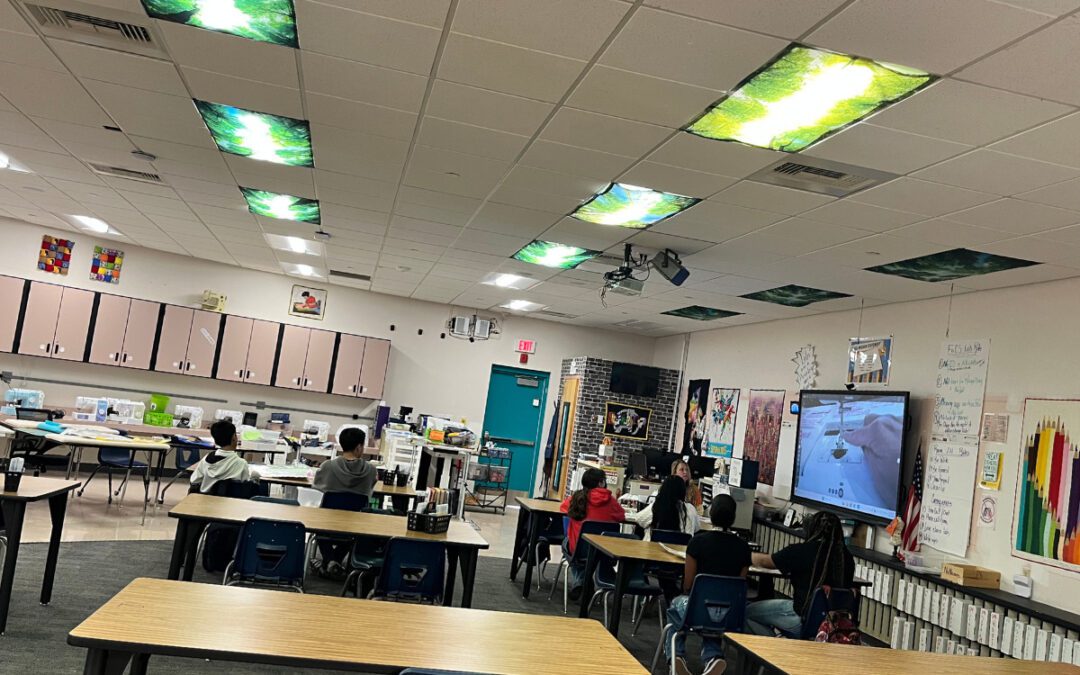
(Erin Clark via Getty Images)
CCSD officials said the school district is replacing “dozens of aging” HVAC systems at schools to ensure children can have a comfortable place to learn, but elected officials and environmentalists say the increasingly hot days are a growing issue for students.
By mid-August, when the school year begins, temperatures in southern Nevada tend to cool down slightly from the 110 to 115 degree days experienced in July, yet teachers and climate advocates this week called on elected officials and the Clark County School District (CCSD) to do more to protect children from extreme heat that might affect their learning.
Vicki Kreidel, an elementary school teacher and president of the National Education Association of Southern Nevada, said children have a harder time focusing in the afternoon when temperatures during recess are above 95 degrees. Although the children might cool down once they get inside, Kreidel said, on days when the air conditioning is not working and classrooms reach 80 to 85 degrees, at some point, it doesn’t make much of a difference.
“It severely affects their ability to get outside and get energy out. Sometimes you find them gathering like in the only shaded spots they have. When they come inside, sometimes I send kids to go wash their face off to cool off a little bit, because you can just tell by looking at them they’re overheated,” Kreidel said at a press conference. “And then when you’re trying to teach in the afternoons, they’re tired, they’re sleepy, they’re miserable, their heads are down on their desk, and we’re just not learning.”
Camalot Todd, director of communications for Nevada Conservation League, recalled her first day of school having just moved to Las Vegas. During her first ever recess in her Downtown Las Vegas school, she said, she experienced more intense heat than she was used to and nearly fainted.
“That was my first brush with 100 degree weather, and my first real experience with how heat isn’t just a number on the dial, it is a real health concern. Now that was two decades ago, which means that it’s only gotten hotter. It’s only gotten worse,” Todd said.
A body of research backs up what Kreidel and Todd argued this week: extreme heat hurts’ kids’ ability to learn.
A Harvard study reviewed the performance of 10 million students who took the standardized PSAT exam between 2001 and 2014 and showed that heat exposure can inhibit cognitive skill development and that school air conditioning can mitigate that effect. Students who experienced hotter school days in the year prior to the test showed reduced learning, the study shows, with extreme heat being particularly damaging for low income and minority students.
Another similar study that looked at 4.5 million New York City public high school exit exams found that students taking an exam on a 90-degree day were nearly 11% less likely to pass than students taking the exam on a 72-degree day.
“On any given day in CCSD, there are schools without working air conditioning. I’ve had multiple reports this year of schools where multiple classrooms had no AC. Some even had a whole wing of the school with no working air conditioning,” Kreidel said. “Sadly, districts that have more marginalized students tend to be the ones least able to keep HVAC systems running properly and updated, and this is certainly the case with Clark County School District. Climate change is here now, not addressing what’s happening and how it will affect our schools is a recipe for disaster.”
Increasingly hot summers in Clark County are straining the school district’s cooling systems, CCSD said in a statement.
The school district also said that staff monitor building temperatures and conduct “ongoing preventative maintenance to improve the performance and reliability of all buildings and systems,” and that when ACs stop working or issues arise, technicians attempt to respond to schools “as quickly as possible.”
The school district is also replacing “dozens of aging” HVAC systems in campuses that have “critical components past their useful life expectancy.”
According to a 2020 report by the US Government Accountability Office, roughly 36,000 schools across the country need to replace or update their heating, ventilation, and air conditioning (HVAC) systems.
The issue of extreme heat isn’t just an educational one — it can be life or death.
Heat-related deaths have been increasing in the US, with approximately 1,600 deaths in 2021, 1,700 in 2022, and 2,300 in 2023 nationwide — of which 307 were reported in southern Nevada. So far in 2024, the Clark County Coroner has identified 181 heat-related deaths — these cases can take up to 90 days to investigate the cause of death and determine whether heat was a factor.
The state is also one of the most urbanized in the nation, with 94% of the population living in areas defined as urban, meaning the urban heat island effect — a term referring to the fact that urbanized areas experience higher temperatures because of the concrete environment with few or no trees — has likely exacerbated warming trends in Las Vegas in particular.
According to the North Carolina Institute for Climate Studies, temperatures in the Silver State have risen almost 2.4 degrees Fahrenheit since the beginning of the 20th century, and over the last two decades, the annual number of “very hot” days (maximum temperatures of 95 degree or higher) a year has consistently surpassed the historical average.
“Now, every single Nevadan lives in an extreme county, every single one of us, it is not that we aren’t seeing the real impacts of climate change,” Todd said. “We are living it right now, but — and I want to say but — that doesn’t mean there isn’t a reason or a cause for hope.”
The hope, Todd said, stems from the federal investments, such as the Inflation Reduction Act, and continued efforts to combat climate change, including the Extreme Weather and Heat Response Modernization Act, which was introduced by Rep. Dina Titus (D-NV) last month.
Titus said her new bill would give the Federal Emergency Management Agency (FEMA) more funding to share with state and local agencies in order to address the problems of extreme heat. A section of the bill calls for FEMA to consider stockpiling and installing portable air conditioners and making community cooling centers part of the FEMA Hazard Mitigation Assistance programs, which provide funding to reduce or eliminate long-term risk from future natural disasters.
“If you don’t recognize that extreme heat is something that impacts education, then you’re not going to be worried about doing anything about it,” Titus said, later adding that solar panels on schools’ rooftops might also be a good idea. “One of the things about the bill with FEMA is that they share resources primarily with the state and then also with the local government, so they can make the determination to put an investment in air conditioning.”
When it comes to long term solutions, Titus said, the priority should be on addressing fossil fuels and climate change to bring down temperatures in order to keep students, families, and tourists safe.
“You can say all you want ‘Oh, but it’s a dry heat.’ Well, if you can fry an egg on the sidewalk, no matter how dry it is, that’s hot,” Titus said.

School choice and low funding create enrollment vacuum for Nevada public schools
As the educational landscape adjusts to structural changes like reduced federal funding, expanded school choice, and charters, enrollment in...

Bright windows and working AC: Woodbury Middle School debuts new campus
The new campus is a result of CCSD’s replacement school program where a school is demolished and rebuilt but CCSD will be pausing new schools...

Qué saber para el regreso a clases en CCSD
Esta nota apareció primero en el boletín Vegas Somos, suscribete aquí. El 11 de agosto es el primer día de clases en el Distrito Escolar del Condado...

Back-to-school fairs in the Las Vegas area (July 26-Aug 9)
There are several back-to-school fairs in the Las Vegas area ahead of the first day of school on Aug. 11—many offering free supplies, CCSD...

Back to class: What to know for the 2025-2026 Nevada school year
This story appeared in The Nevadan newsletter, subscribe here. The first day of school in Nevada is Aug. 11. Here are some reminders and things to...

Lombardo supports Trump’s executive order to dismantle education department
Nevada Attorney General Aaron Ford called out Lombardo for supporting the elimination of the Department of Education, claiming the governor “sold...





